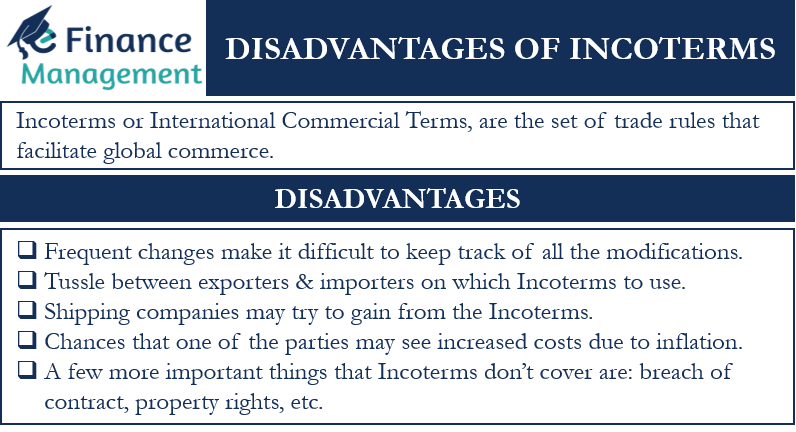Incoterms or International Commercial Terms is the set of trade rules that facilitate global commerce. These terms are published and updated by ICC (International Chamber of Commerce) and mainly apply to means of transportation, as well as the transfer of liability from one party to another in case of international trade. The primary aim of Incoterms is to avoid confusion in foreign trade contracts by laying down the responsibilities of the importers and exporters. This way, the terms help to overcome language barriers as well. Though the Incoterms are very popular and helpful in foreign trade, they suffer from some drawbacks as well. In this article, we will take a look at the disadvantages of Incoterms.
Disadvantages of Incoterms
The following are the disadvantages of Incoterms:

- The ICC first came up with Incoterms in 1936, and since then, these terms have undergone several drastic changes. Moreover, the ICC also regularly updates these terms. Though these changes are for good, frequent changes could make it difficult for companies to keep track of all the modifications. This, in turn, could impact their business and revenues. Or, we can say it could benefit one party at the expense of another.
- There is often a tussle between exporters and importers on which Incoterms to use. For instance, sellers prefer CIF as it gives them more control over their cargo, while buyers go for FOB for the same reason. Such preferences could make negotiations harder and result in delays.
- It is possible that shipping companies may try to gain from the Incoterms. Similar to buyers and sellers, shipping companies also have their own preference for Incoterm. They usually prefer terms that give them more control but less risk.
- With some Incoterms, there are chances that one of the parties may see increased costs due to inflation. This other party is usually the seller, as he or she is typically responsible for paying freight and insurance. If negotiations take longer than expected, then chances are that costs may rise due to inflation. For instance, an increase in oil prices could result in more shipping costs.
- Incoterms cover almost all aspects of international trade. Yet there are a few vital things that they don’t yet cover. One such thing is the transfer of titles or ownership of valuable equipment. A few more important things that Incoterms don’t cover are a breach of contract, property rights, and more. Thus, it is extremely important for parties to clear these terms beforehand and not leave things to Incoterms.
Final Words
Despite these drawbacks, Incoterms are extremely popular in international trade contracts. This is because they make international trade easier by clarifying the responsibilities of both parties.
RELATED POSTS
- Inland Bill of Lading – Meaning, Importance and More
- Cost, Insurance, and Freight – Meaning, Obligations, Advantages, and Disadvantages
- Differences Between International Business and International Trade
- EXW Ex Works – Meaning, Pros, Cons, and More
- International Trade – Types, Importance, Advantages And Disadvantages
- Delivered at Terminal – Meaning, Obligations and More

